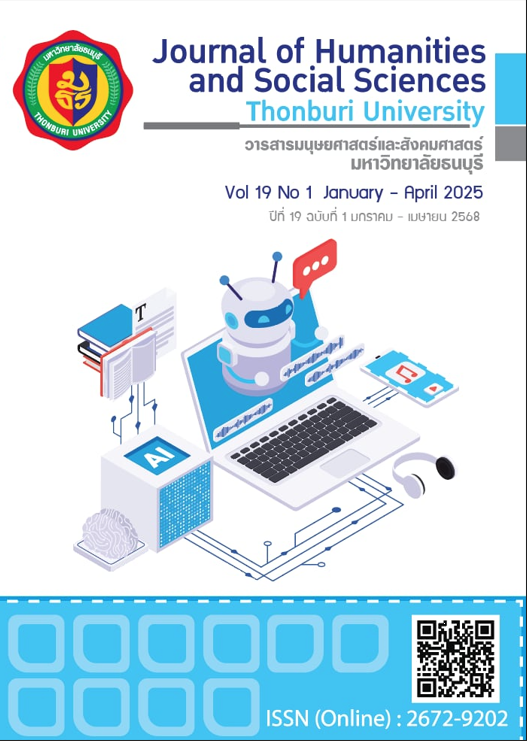Professional accounting skills and professional accounting ethics that affect the efficiency of work of the Accountant in Samut Sakhon Province
Keywords:
accounting skills, accounting ethics, efficiency performance, AccountantAbstract
The objective of this research was to examine the relationship and the influence of professional accounting skills and accounting ethics that affect the effective work performance of accountants in Samut Sakhon Province. The data was collected from accountants who are registered accountants with the Federation of Accounting Professions under the Royal Patronage in Samut Sakhon Province. The research instrument was questionnaire used for data collection from the samples of 329 respondents selected by convenience and the number of respondents was 302 people. The statistics used in the analysis are multiple regression analysis using Enter and Stepwise to examine the hypotheses. The research results found that professional accounting skills in the digital age and skills of workers in the 21st century have a significant influence on the efficient work of accountants at the 0.05 level. The coefficient of adjusted forecast (R Square) used to compare models with unequal number of predictive variables was obtained with a value of 0.891, which could explain the positive influence on the work efficiency of accountants at 89.1 percent. The accounting professional's ethics in terms of having knowledge, ability, attentiveness, confidentiality, objectivity, and honesty has a significant influence on the efficient work performance of the accountant at the .05 level. The coefficient of adjusted forecast (R Square) used to compare models with unequal number of predictive variables was obtained with a value of 0.987, which could explain the positive influence on the performance efficiency of accountants at 98.7 percent.
References
กุลธิดา ธนสมบัติศิริ; และ ดารณี เอื้อชนะจิต. (2565). ทักษะทางวิชาชีพบัญชีที่ส่งผลต่อความเชี่ยวชาญของผู้ประกอบวิชาชีพบัญชี. วารสาร มทร.อีสาน ฉบับมนุษยศาสตร์และสังคมศาสตร์. 9(2): 12-23.
จุมพฏ ไพรรัตนากร. (2561). จรรยาบรรณของผู้ประกอบวิชาชีพบัญชี. สภาวิชาชีพบัญชีในพระบรมราชูปถัมภ์. สืบค้นเมื่อ 22 มกราคม 2567, จาก https://www.tfac.or.th/upload/9414/Cfa7FQFNRw.pdf
ประสุตา นาดี, ธุวพร โคนพันธ์, กมลลักษณ์ มาตราช, ทัศนัย นาทัน, ตวัน ทัศนบรรลือ, ปานชีวา กุลีสูงเนิน, ศุภาพิชญ์ ตรงวัฒนาวุฒิ, บุษยมาส เทียนกระจ่าง, พรพิมล หว่างพัฒน์, และ ศุภกัญญา ภูทองกิ่ง. (2564). สมรรถนะของนักบัญชีในยุคดิจิทัล: ทักษะการปรับตัวในโลกที่เปลี่ยนแปลง. วารสารศิลปศาสตร์และวิทยาการจัดการ มหาวิทยาลัย เกษตรศาสตร์. 8(2): 19-32.
พัทธนันท์ เพชรเชิดชู. (2560). ต้องรู้อะไรก่อนที่จะบอกว่าคุณเป็นนักบัญชีดิจิทัล. สืบค้นเมื่อ 18 ธันวาคม 2566, จาก https://www.dpu.ac.th/th/college-of-innovative-business-and-accountancy
รองเอก วรรณพฤกษ์. (2564). จรรยาบรรณสำหรับผู้ประกอบวิชาชีพบัญชี. สืบค้นเมื่อ 18 มกราคม 2567, จาก http://dspace.spu.ac.th/handle/123456789/7944
รัชนก ขวัญอ่อน. (2564). จรรยาบรรณและทักษะทางวิชาชีพบัญชีที่ส่งผลต่อความสำเร็จของนักบัญชี ในเขตกรุงเทพมหานคร. การค้นคว้าอิสระ บัญชีมหาบัณฑิต คณะบัญชี มหาวิทยาลัยศรีปทุม.
ศิริกาญจน์ วงษ์เสรี และสุรีย์ โบษกรณัฏ. (2559). ปัจจัยที่มีผลต่อประสิทธิภาพการทำงานของนักบัญชีสถาบันการเงินเฉพาะกิจ. วิทยานิพนธ์ปริญญาบัญชีมหาบัณฑิต, มหาวิทยาลัยเกษตรศาสตร์.
สภาวิชาชีพบัญชีในพระบรมราชูปถัมภ์. (2564). คู่มืออธิบายกรอบแนวคิดการรายงานทางการเงิน (ฉบับปรับปรุงใหม่).สืบค้นเมื่อ 18 มีนาคม 2567, จาก https://acpro-std.tfac.or.th.
สวนีย์ สุวรรณรัตน์. (2567). ปัจจัยที่ส่งผลต่อคุณภาพของงบการเงินจากมุมมองของนักบัญชีของบริษัทที่จดทะเบียนในตลาดหลักทรัพย์ SET100. การค้นคว้าอิสระ หลักสูตรบัญชีมหาบัณฑิต มหาวิทยาลัยศรีปทุม.
อภินห์พร จับประยงค์. (2567). ปัจจัยการปฏิบัติงานการเงินและบัญชีที่ส่งผลต่อประสิทธิภาพการปฏิบัติงานของเจ้าหน้าที่การเงินและบัญชี สำนักงานเขตพื้นที่การศึกษามัธยมศึกษาในเขตภาคเหนือ. วารสารบัญชีปริทัศน์ มหาวิทยาลัยราชภัฏเชียงราย. 9(1): 227-246.
Azuraidah, Taib, Yunita, Awang, Shazalina, Mohamed, Shuhidan, Norfadzilah, Rashid, Mohd, Sidki Hasan. (2022). Digitalization in Accounting: Technology Knowledge and Readiness of Future Accountants. Universal. Journal of Accounting and Finance. 10(1): 348-357.
Cronbach, L. J. (1990). Essentials of psychological testing. 5thed. New York: Harper & Row.
David Drewery, Robert Sproule & T. Judene Pretti. (2020). Lifelong learning mindset and career success: evidence from the field of accounting and finance. Higher Education Skills and Work-based Learning. 10(3): 567-580.
Hamood Mohammed Al-Hattami. (2024). The influence of accounting information system on management control effectiveness: The perspective of SMEs in Yemen. Sage Journal. 40: 75-93. Retrieved April 8, 2024 from https://doi.org/10.1177/02666669221087184.
Marcus TH Lee. (2023). Digital Disruption and Transformation. Leading in a Digitally Disruptive World. NJ. Singapore: Word Scientific.
Mohammad Abdul Ghani; & Ani Wilujeng Suryani. (2020). Professional Skills Requirements for Accountants: Analysis of Accounting Job Advertisements. Journal ASET (Akuntansi Riset for Accountants, 12(2): 212-226.
Neetika Maheshwari. (2023). Ethics in Accounting: Upholding Integrity and Professionalism. CPA, Accountants and International Tax advisors for start ups. Retrieved March 12, 2024 from https://www.linkedin.com/pulse/ethics-accounting-upholding-integrity-professionalism
Oyebisi M. Ibidunni, Wisdom Okere, Ayodotun Ibidunni, Abimbola Joshua, Eche Okah. (2018). Accounting ethics and the performance of accounting firms in lagos, Nigeria. Journal of Finance and Marketing. 2(2): 10-16.
Paul Jaijairam. (2017). Ethics in Accounting. Journal of Finance and Accountancy. 23: 1-13, Retrieved March 8, 2024, from https://www.aabri.com/manuscripts/172705.pdf
Yamane, Taro. (1973). Statistics and Introductory analysis. New York: Harper & Row.
Translated Thai References
Apinporn, J. (2024). Financial and accounting operational factors that affect staff performance. Finance and accounting Secondary Educational Service Area Office in the Northern Region. The Journal of Accounting Review Chiang Rai Rajabhat University. 9(1): 227-246 (in Thai)
Federation of Accounting Professions. (2023). A guide to explaining the financial reporting framework. Retrieved March 11, 2024 from https://acpro-std.tfac.or.th. (in Thai)
Kwan-On, R. (2021). Ethics and Professional Accounting Skills. (Master of Accountancy Individual Study, Sripatum University). (in Thai)
Na-dee, P., Khonepun, T., Matarat, K., Na-tun, T., Tasanabunleou, T., Kuleesungnean, P., Trongwatanavut, S, Teankrajang, B., Whang-put, P., & Phuthongking, S. (2021). The digital Accountants’ Competency: Skills in Transformed World. Journal of Liberal Arts and Management Science Kasetsart University. 8(2): 19-32. (in Thai)
Pedcherdchu, P. (2017). What do you need to know before you say you're a digital accountant?. Retrieved 18 December, 2023 from https://www.dpu.ac.th/th/college-of-innovative-business-and-accountancy (in Thai)
Prairattanakorn, J. (2018). Ethics in Accounting Professional. Federatio of Accounting Professions Retrieved January 22, 2024, from https://www.tfac.or.th/upload/9414/Cfa7FQFNRw.pdf (in Thai)
Sawanee, S. (2024). Factors Affecting The Quality of Financial Statements from Perspective of The Accountants of The Listed Companies SET 100. (Master of Accountancy Individual Study, Sripatum University). (in Thai)
Thanasombatsiri, K.; & Uachanachit, D. (2022). Accounting Professional Characteristics in New Era Affecting the Performance of Accountants in Accounting Firms in Bangkok Metropolitan Areas. RMUT Journal Humanities and Social Sciences. 9(2): 12-23. (in Thai)
Wannapreuk. R. (2017). Code of Ethics for Accounting Professionals. Retrieved January 18, 2024 from http://dspace.spu.ac.th/handle/123456789/7944 (in Thai)
Wongseree, S.; & Bhoatkoranut, S. (2016). Factors Affecting Work Efficiency of Accountants at Specialized Financial Institutions. (Master of Accountancy, Kasetsart University). (in Thai)
Downloads
Published
How to Cite
Issue
Section
License
Copyright (c) 2024 siriwan Jankaew, Thanawan Changkomchome

This work is licensed under a Creative Commons Attribution-NonCommercial-NoDerivatives 4.0 International License.
ผลงานที่ปรากฎในวารสารฉบับนี้เป็นลิขสิทธิ์เฉพาะส่วนบุคคลของผู้เขียนซึ่งต้องรับผิดชอบต่อผลทาง กฎหมายที่อาจเกิดขึ้นได้และไม่มีผลต่อกองบรรณาธิการ






